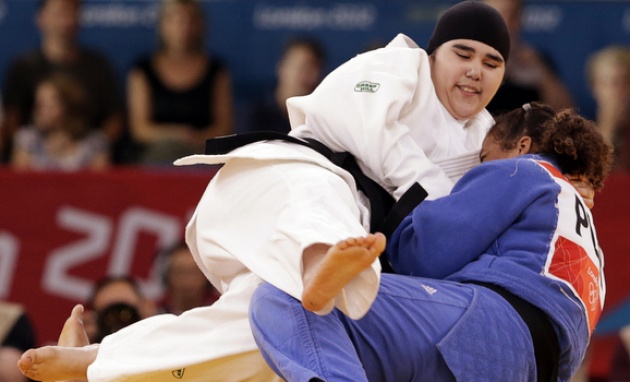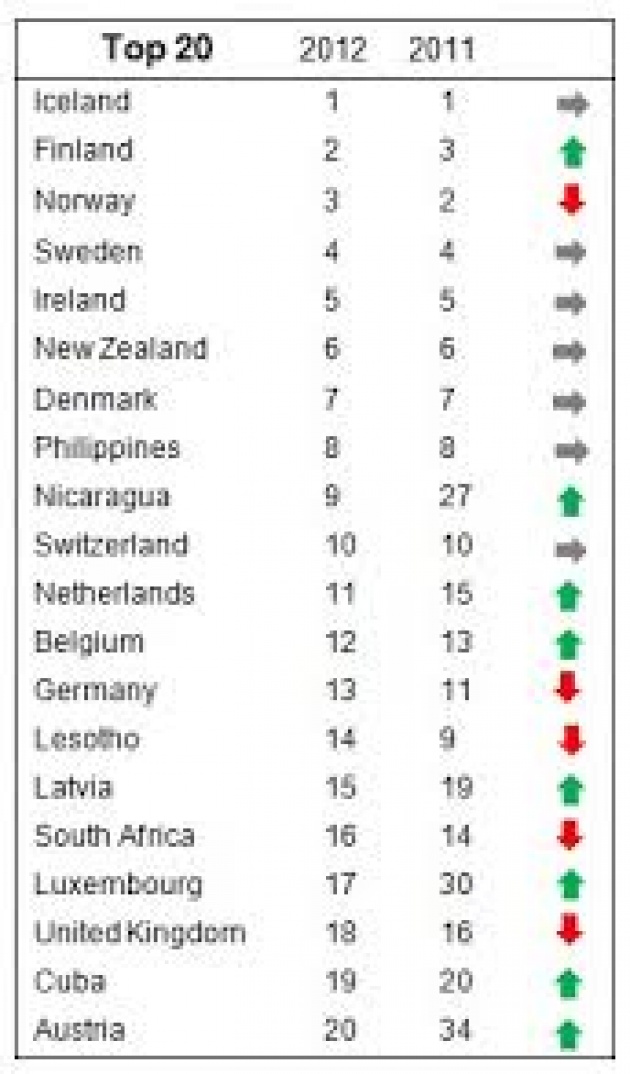
Saudi Arabia is one of the wealthiest countries in the world. Oil - which accounts for more than 95% of all exports and 70% of the government revenue - has allowed this nation to change from a desert kingdom to one of the most developed countries on the planet. Yet, women in Saudi Arabia are heavily discriminated, and continue to suffer the repression of a chauvinistic culture that has been going on uninterrupted for centuries.
In order for a Saudi woman to study in a university, own a business, or even travel abroad, she needs the approval of a male "guardian" who acts as she were a minor. Although this is not legally required, officials still demand it, and women end up depending on their guardians' authorization. Women are not allowed to publicly sit in the company of men, and there are separate section in every public place for them to stay. They are obliged to wear clothes covering their whole body, to the point that female athletes have been discriminated since the beginning of competitive sports. We all remember the controversy surrounding Wajdan Shaherkani in last year's Olympic Games, who was finally allowed to participate in the Judo championships thanks to a compromise reached with the Saudi government.

Female literacy rate in Saudi Arabia is estimated to be around 70% compared to 85% of their male counterpart, mostly because many girls are forced into marriage at early age. Men are legally allowed to practice polygamy, while women are punished by being stoned to death. Men can easily divorce their wives, but women need the consent of their husbands. Divorce is also possible if they can prove that their husbands physically abused them, but a Saudi court would rarely convict a man of such crime. This is the reason domestic violence goes widely unreported in this country. Women are not even allowed to drive - the only nation in the world practicing this law - let alone advocating for their rights. In 2011 King Abdullah announced that in the following round of municipal elections Saudi women would be able to vote and run for office. However, a male guardian's permission will be needed in order for them to cast their vote. I don't mean to have the presumption to know everything about the culture of Saudi Arabia, and I'm aware that I'm painting just a limited picture of the situation of women in this country. Nevertheless, this is enough to be shocked.

It's not surprising that the World Economic Forum 2012 Global Gender Gap Report ranked Saudi Arabia 131st out of 135 countries for gender parity. What is surprising, though, is the fact that some countries aren't even on the list. It's the case of Afghanistan, a nation in which so many women are so heavily repressed that it's not even possible to gather accurate data. Women rights in Afghanistan are restrained to the point that some of them don't even leave their homes anymore. In some rural areas Afghan women can't go to the market without being accompanied by a male relative. They are not allowed to talk to other men in public. Some have been thrown acid on their faces just because they were looking at men. Not an inch of their skin is allowed to show when they exit their houses, to the point that many contract skin diseases due to the heat, moist and lack of ventilation. Despite recent improvements, education for women in Afghanistan remains a privilege rather than a right, and the Afghanistan literacy rate for females continues to be one of the lowest in the world. In addition, women in Afghanistan who owe a business are a rare encounter, and those who do have to face the reality of living in a world in which their talent and knowledge are always doubted by the surrounding men. Women with power in Afghanistan are infrequent, and those who have it often need to watch their backs. Forced marriages, domestic violence and honor killings are still a reality in this country, and many Afghan girls are still being sold as spouses to pay debts between families. Sadly, freedom and independence of women remain abstract concepts.

Afghanistan culture can't and won't change overnight, and it won't do it by itself. Outside support is needed to raise global awareness about the discrimination that women have to endure on a daily basis. Several foreign companies are working to facilitate female empowerment, so that one day every woman in Afghanistan - and the rest of the world - can receive justice for the violations she has endured, and can live her life the way she desires. One of these organizations is Women's Annex, a self-sustaining website launched by Film Annex, a business offering a platform for independent film makers to showcase their work. Women's Annex provides women from all over the world with a place where they can share their stories online without the fear of retaliations. Their idea is that the experience of a woman standing up for her rights and fighting back against her perpetrator/s can inspire countless others to do the same. Women's Annex also rewards writers with a monetary revenue, so that those women contributing to the site can make an additional step toward their independence. In the words of the organization itself: "The platform promotes and supports women's empowerment within and outside of Central and South Asia with videos, instructional programs, and blog stories about education, business, sports, and a variety of other topics. Women's Annex encourages women in developing countries to be financially independent self-starters. Women perform better than men on social media, especially women from developing countries. For cultural reasons, many women in developing countries spend more time at home and in front of a computer. Women's Annex now allows women to capitalize on this cultural shift in Digital Media, and it has been positioned by Film Annex Founder and President Francesco Rulli to allow women in developing countries to take charge of their financial lives."

The Kingdom of Saudi Arabia is a wealthy and developed nation. It possesses enough resources to guarantee freedom and independence to every Saudi Arabian. Yet, women are still regarded - and treated - as second class citizens. Change could - and should - start with a progressive education, but Saudi women are still forbidden from studying subjects like engineering, journalism, architecture and law. Moreover, change won't be possible without a more democratic vision of society. In Saudi Arabia dissidents are not exactly welcome in the country, and continue to receive special treatment. Mohammed Al-Qahtani, an economics professor in Riyadh, is personally paying the consequences of a repression that goes beyond gender discrimination. He is one of Saudi Arabia's most prominent human rights activists, and because of this, he's facing charges such as "breaking allegiance to the Saudi king, describing Saudi Arabia as a police state and turning people and international bodies against the kingdom". If convicted, he could be jailed for years. Al-Qahtani describes that the true reason the kingdom is prosecuting him is because his activist group is working to expose violations of human rights in the country. He reports that the Saudi authorities have been persecuting activists by using torture, arbitrary imprisonment or simply having them disappear. These are heavy accusations confirmed by the demonstrations of the activists' family members around the country. A few weeks ago a group of women and children who were calling for the release of their relatives were arrested by the police. They were only peacefully expressing their frustration for the autocratic decision to imprison their loved ones without any fair trial or lawyers.

Today Saudi Arabia is missing a golden opportunity. The rulers of this country could show tremendous leadership by allowing important reforms to happen in their society. Instead, they're choosing to keep things the way they are, denying half of the population those rights that are paramount in a civilized nation. Towering skyscrapers are being raised and luxurious estates being built, but women are still being downgraded to lower-class citizens, and anybody trying to bring equality and progress to the table is being mercilessly silenced. Everybody is looking at your next move, Saudi Arabia, including Afghanistan, a country at war with far fewer resources in hand.
Giacomo Cresti
http://www.filmannex.com/webtv/giacomo
follow me @ @giacomocresti76



